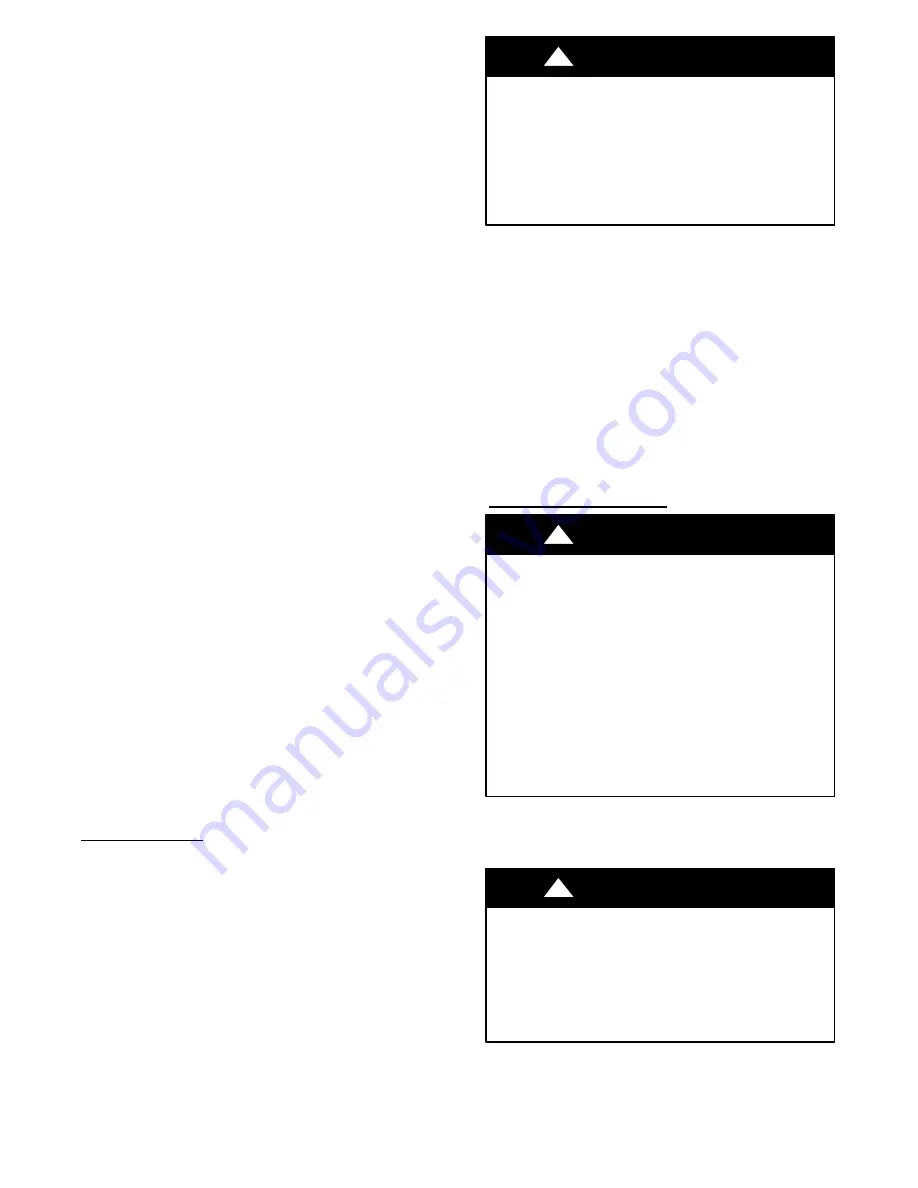
36
The control system also requires an earth ground for proper
operation of the control and flame--sensing electrode.
The 24--v circuit contains an automotive--type, 3--amp. fuse
located on the control. (See Fig. 45) Any shorts of the 24--v
wiring during installation, service, or maintenance will cause this
fuse to blow. If fuse replacement is required, use ONLY a 3--amp.
fuse. The control LED will display status code 24 when fuse
needs to be replaced.
Proper instrumentation is required to service electrical controls.
The control in this furnace is equipped with a Status Code LED
(Light--Emitting Diode) to aid in installation, servicing, and
troubleshooting. Status codes can be viewed at the sight glass in
blower access door. The amber furnace control LED is either ON
continuously, rapid flashing, or a code composed of 2 digits. The
first digit is the number of short flashes, the second digit is the
number of long flashes..
For an explanation of status codes, refer to service label located
on blower access door or Fig. 38 and the troubleshooting guide
which can be obtained from your distributor.
See Fig. 38, a brief Troubleshooting Guide.
For Variable Speed ECM Controls the stored status codes will
NOT be erased from the control memory, when 115-- or 24--v
power is interrupted. The control will store up to the last 7 Status
Codes in order of occurrence.
1. To retrieve status codes, proceed with the following:
NOTE
: NO thermostat signal may be present at control, and all
blower--OFF delays must be completed.
a. Leave 115--v power to furnace turned on.
b. Remove outer access door.
c. Look into blower access door sight glass for current
LED status.
d. Remove blower access door.
NOTE
: The Status Codes cannot be retrieved by disconnecting
the limit switch or draft safeguard switch. To retrieve Status
Codes, follow the procedure below.
2. Turn Setup Switch, SW1--1 “ON.”
3. Manually close blower access door switch.
4. Control will flash up to 7 Status Codes.
5. The last Status Code, or 8th Code, will be code 11 .
6. Turn SW1--1 “OFF.”
7. The Amber LED will be continuously--lit which indicates
proper operation.
8. Release blower access door switch, install blower access
door and replace outer door or refer to the SERVICE label
on the front of the blower access door for more informa-
tion.
Component Self--Test
Component Test can ONLY be initiated by performing the
following:
1. Remove outer access door.
2. Remove blower access door.
3. Remove the wire from the “R” terminal of the control
board.
4. Turn Setup Switch, SW--1--6 “ON.”
5. Manually close blower access door switch.
Blower access door switch opens 115--v power to control. No
component operation can occur unless switch is closed. Caution
must be taken when manually closing this switch for service
purposes.
ELECTRICAL SHOCK HAZARD
Failure to follow this warning could result in personal injury,
or death.
Blower access door switch opens 115--v power to furnace
control. No component operation can occur unless switch is
closed. Exercise caution to avoid electrical shock from
exposed electrical components when manually closing this
switch for service purposes.
!
WARNING
6. Component Test sequence will function as follows:
a. Inducer motor turns on at 50% duty cycle for 15 secs,
then stays on for the entire test.
b. Hot surface ignitor is energized for 15 sec, then
deenergized.
c. Blower operates for 15 sec, then turns off.
d. After component test is completed, one or more status
codes (11, 25, 41 or 42) will flash. See component test
section of service label for explanation of status codes.
NOTE
: To repeat component test, turn setup switch SW1--6 OFF
then back ON.
e. Turn setup switch SW1--6 OFF.
7. RELEASE BLOWER ACCESS DOOR SWITCH, reat-
tach wire to “R” terminal on furnace control board, replace
blower access door, and replace outer access door.
CARE AND MAINTENANCE
FIRE OR EXPLOSION HAZARD
Failure to follow this warning could result in personal
injury, death and/or property damage.
Never store anything on, near, or in contact with the
furnace, such as:
1. Spray or aerosol cans, rags, brooms, dust mops,
vacuum cleaners, or other cleaning tools.
2. Soap powders, bleaches, waxes or other cleaning
compounds, plastic or plastic containers, gasoline,
kerosene, cigarette lighter fluid, dry cleaning fluids,
or other volatile fluids.
3. Paint thinners and other painting compounds, paper
bags, or other paper products.
!
WARNING
For continuing high performance and to minimize possible
equipment failure, periodic maintenance must be performed on
this equipment. Consult your local dealer about proper frequency
of maintenance and the availability of a maintenance contract.
ELECTRICAL SHOCK AND FIRE HAZARD
Failure to follow this warning could result in personal
injury, death or property damage.
Turn off the gas and electrical supplies to the unit and install
lockout tag before performing any maintenance or service.
Follow the operating instructions on the label attached to
the furnace.
!
WARNING









































